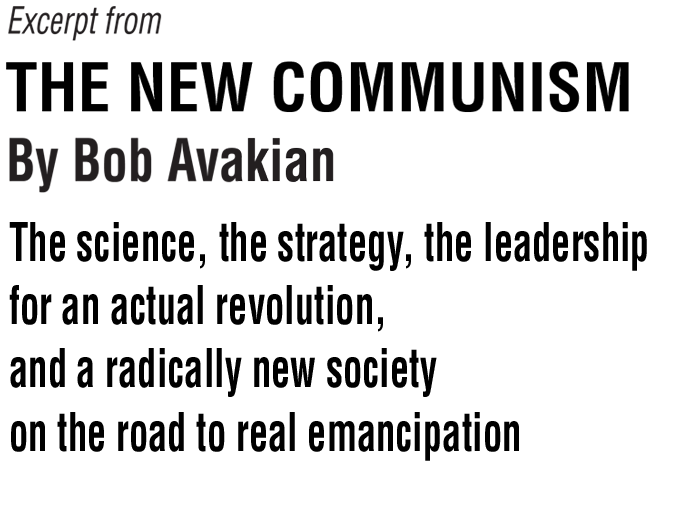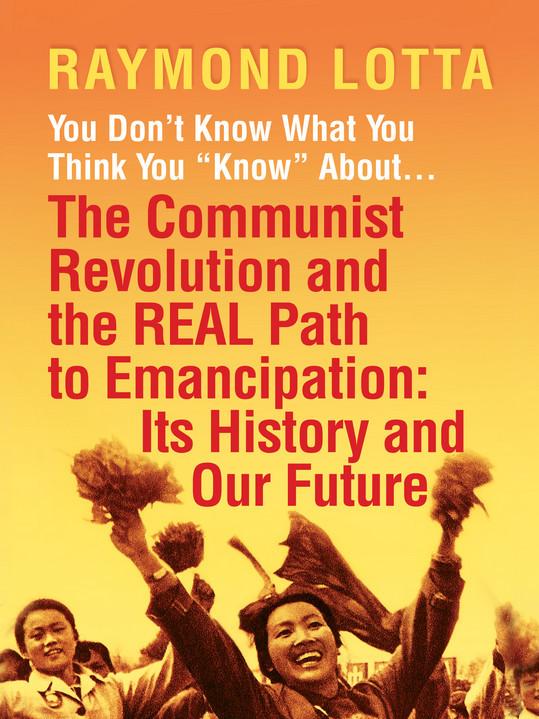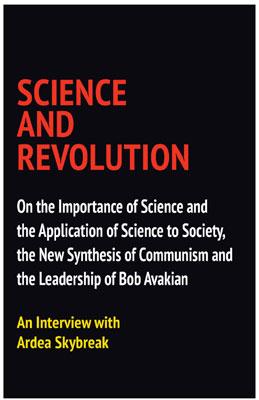
The following is an excerpt from the work by Bob Avakian, The New Communism. In addition to this and other excerpts posted on revcom.us, we will be running further excerpts from time to time on revcom.us. These excerpts should serve as encouragement and inspiration for people to get into the work as a whole, which is available as a book from Insight Press and as a PDF online at revcom.us.


This excerpt comes from the section titled "II. Socialism and the Advance to Communism: A Radically Different Way the World Could Be, A Road to Real Emancipation."
Now, in relation to this, I wanted to quote something from a fairly recent book. It’s from the “Prologue” of this book, The American Way of Poverty: How the Other Half Still Lives,36 by Sasha Abramsky, who is sort of a good liberal writing about how there is still a lot of poverty in America. But he feels obliged at the beginning of this book to state the following: “After all, no society in human history has ever successfully banished poverty; and no polity with a modicum of respect for individual liberty has entirely negated the presence of inequality.” Now let’s break this down. First of all, to borrow a phrase from Marx (and maybe at the same time to borrow a phrase from the movie, Cool Hand Luke): What we have here is a poverty of philosophy—a poverty of imagination and of understanding. It’s true that nowhere, neither in the Soviet Union nor in China when they were socialist, did they completely abolish poverty. They were starting from situations of very impoverished masses of people, but they made tremendous strides toward abolishing poverty. And, at the end of his life, when Mao was battling—on his deathbed, basically—with these revisionists who have since come to power and restored capitalism in China, that was a big part of the struggle. The revisionists were arguing—and they now have implemented and are celebrating—that if we go the capitalist route, we can elevate sections of the population out of poverty. And they declare now that they’ve raised several hundred million people out of poverty. But what they’ve done in essence is created the most crass and horrible society, the most crude kind of commodity relations, where they have these newborn entrepreneurs—in other words, newborn exploiters (some millionaires, even some billionaires)—but the masses of people are still enmeshed in horrible conditions of poverty, hundreds and hundreds of millions of people, and all the old social relations—prostitution, and all kinds of other horrific things—have come back with a vengeance. What Mao was arguing was this: We have to stay on the socialist road; we have to lift up the entire people, step by step, out of poverty, rather than going for a “get rich quick” thing of making China a powerful modern country and raising up certain parasitic bourgeois strata, and certain privileged petit bourgeois strata, while the masses of people continue to suffer. Unfortunately, the wrong side in that struggle won out. But, before that, with the socialist system, they had made tremendous gains in eliminating poverty, and you can read about that in the special issue of Revolution—the Interview with Raymond Lotta37—about the history of communism and the lessons for the future of humanity. It is pointed out there, for example, that when the revolution triumphed in China, around 1950, life expectancy on the average was something like 32 years. That’s how long people lived on the average. And by the time capitalism was restored (or by 1975, just before it was restored), life expectancy in China had doubled to something around 65. And that was pretty near world standards at that time. Coming from this tremendous background and situation of massive poverty, that was a tremendous change, through which a lot of people had been lifted out of dire poverty. So, on the one hand, this guy Abramsky just wipes out this whole experience, or discounts it.
And then you get to the second part, which is put in language that we should break down a little bit: “no polity with a modicum of respect for individual liberty,” he says—in other words, no society, with even a minimum of respect for individual liberty—“has entirely negated the presence of inequality.” And the implication of what he’s saying is not just that this hasn’t been done, but that you shouldn’t do that—that if you try to eliminate all inequality, you are bound to violate people’s rights, bound to violate civil liberties. In other words, you could only do that by “totalitarian” means—this is, in essence, what he’s saying. And, here again, we see the total lack of what? Of the ability to see beyond the narrow horizon of bourgeois right. To see beyond this to where a society would actually operate on the principle of “From each according to their ability, to each according to their needs.” Here’s the thing about communism: It’s not like Alain Badiou, and these opportunists who have taken up a lot of his thinking, argue—it’s not that communism is just the urge to equality. No. Communism involves moving beyond equality. It’s moving beyond where equality is a question. Why? Because we want gross inequality? No. Because when you move to communism, and you get beyond commodity production and exchange and the law of value—and you go according to ability and need, as the slogan says—then you’ve actually gotten to a point where equality doesn’t figure in. Marx pointed out—and this is something that was also brought out in the Cultural Revolution in China—that every equality also involves inequality. For example, if you are working on a job next to me, and you’re a single mother with three kids and I’m just a guy taking care of myself, we get the same wage, but it’s not really equal. It’s equal, but it’s unequal, because you have much greater needs, so the wage you get doesn’t give you equality with me in a real sense, because I don’t have as many people who are dependent on me. And then there’s also the fact that everybody and all their abilities are not equal. This is something that was brought out in the Ardea Skybreak Interview very powerfully. What about the idea that everybody should be equal? And she responds, why do people say such stupid things?! Then she goes on to say, look, everybody doesn’t have the same inclinations, the same strengths, they can’t do all the same things with the same quality, and so on. And I don’t feel badly, she says, if some people can do some things better than me—if somebody is a high level artistic performer and they get up on the concert stage, I don’t think I should be up there trying to match them in what they’re doing.
It’s like that ad—maybe you’ve seen it—where they say, OK today for this symphony performance, instead of having the world class violinist Itzhak Perlman, we’re gonna have Rhea Perlman, the comedian, play the violin. And she comes out and goes arreee-a-reee-reee, making a horrible screeching sound with a violin. No, everybody is not equal in everything. So if you and I are doing the same work, the work we do, what we put in, may not be equal in terms of the quality of our work. So when we get the same wage, it’s equal, but it’s unequal, because you’re actually contributing more with your work, the quality of your work is higher. When you get beyond commodity relations, you deal with need, with people contributing and then getting back on the basis of need—you’ve removed the question of equality and inequality from the picture. You’re just going according to people’s abilities and needs.
So, once again, if you can’t see beyond this narrow horizon of commodity relations, then you can’t see how you could have a society in which you have no poverty and at the same time there is a flourishing of people’s intellectual, cultural and social life, and even the question of rights would have no meaning in the sense in which it does today.
In any case, rights are always a contradictory thing. Rights are always a matter of contradiction—the rights of certain people are always in contradiction with the rights of other people, and rights always have limits on them. Think about this—you have probably heard this, although it’s almost always misquoted—you hear people say: “Freedom of speech is not absolute; you can’t shout ‘fire!’ in a crowded theater.” See, they usually don’t state it quite correctly: You can’t shout “fire!” in a crowded theater, if there is no fire. But, anyway, that is a limitation on free speech. Now, in this society—here’s another contradiction—they always talk as if things are in terms of the individual and individual rights, but fundamentally they’re in terms of social relations. And that’s true of speech, and limitations on speech. Shouting “fire!” in a crowded theater, when there is no fire, does harm socially—and, more specifically, it does harm to the interests of the ruling class, it undermines their ability to maintain order and stability and to have people believe that they can run a well-regulated society. Of course, it might also harm individuals who could get trampled in this situation, but that’s not the fundamental and essential reason that there is this limitation on free speech. It’s the social effect—and, more specifically, the way in which this would affect the interests of the ruling class—that is the decisive and determining thing.
36. Sasha Abramsky, The American Way of Poverty: How the Other Half Still Lives (Nation Books, 2014). [back]
37. Raymond Lotta, “You Don’t Know What You Think You ‘Know’ About...The Communist Revolution and the REAL Path to Emancipation: Its History and Our Future,” an Interview with Raymond Lotta. Special issue of Revolution #323, November 24, 2013. Available at revcom.us. Also available as an eBook from insight-press.com. See also thisiscommunism.org. [back]
Contents
Publisher's Note
Introduction and Orientation
Foolish Victims of Deceit, and Self-Deceit
Part I. Method and Approach, Communism as a Science
Materialism vs. Idealism
Dialectical Materialism
Through Which Mode of Production
The Basic Contradictions and Dynamics of Capitalism
The New Synthesis of Communism
The Basis for Revolution
Epistemology and Morality, Objective Truth and Relativist Nonsense
Self and a “Consumerist” Approach to Ideas
What Is Your Life Going to Be About?—Raising People’s SightsPart II. Socialism and the Advance to Communism:
A Radically Different Way the World Could Be, A Road to Real EmancipationThe “4 Alls”
Beyond the Narrow Horizon of Bourgeois Right
Socialism as an Economic System and a Political System—And a Transition to Communism
Internationalism
Abundance, Revolution, and the Advance to Communism—A Dialectical Materialist Understanding
The Importance of the “Parachute Point”—Even Now, and Even More With An Actual Revolution
The Constitution for the New Socialist Republic in North America—
Solid Core with a Lot of Elasticity on the Basis of the Solid Core
Emancipators of HumanityPart III. The Strategic Approach to An Actual Revolution
One Overall Strategic Approach
Hastening While Awaiting
Forces For Revolution
Separation of the Communist Movement from the Labor Movement, Driving Forces for Revolution
National Liberation and Proletarian Revolution
The Strategic Importance of the Struggle for the Emancipation of Women
The United Front under the Leadership of the Proletariat
Youth, Students and the Intelligentsia
Struggling Against Petit Bourgeois Modes of Thinking, While Maintaining the Correct Strategic Orientation
The “Two Maximizings”
The “5 Stops”
The Two Mainstays
Returning to "On the Possibility of Revolution"
Internationalism—Revolutionary Defeatism
Internationalism and an International Dimension
Internationalism—Bringing Forward Another Way
Popularizing the Strategy
Fundamental OrientationPart IV. The Leadership We Need
The Decisive Role of Leadership
A Leading Core of Intellectuals—and the Contradictions Bound Up with This
Another Kind of “Pyramid”
The Cultural Revolution Within the RCP
The Need for Communists to Be Communists
A Fundamentally Antagonistic Relation—and the Crucial Implications of That
Strengthening the Party—Qualitatively as well as Quantitatively
Forms of Revolutionary Organization, and the “Ohio”
Statesmen, and Strategic Commanders
Methods of Leadership, the Science and the “Art” of Leadership
Working Back from “On the Possibility”—
Another Application of “Solid Core with a Lot of Elasticity on the Basis of the Solid Core”Appendix 1:
The New Synthesis of Communism:
Fundamental Orientation, Method and Approach,
and Core Elements—An Outline
by Bob AvakianAppendix 2:
Framework and Guidelines for Study and DiscussionNotes
Selected List of Works Cited
About the Author

